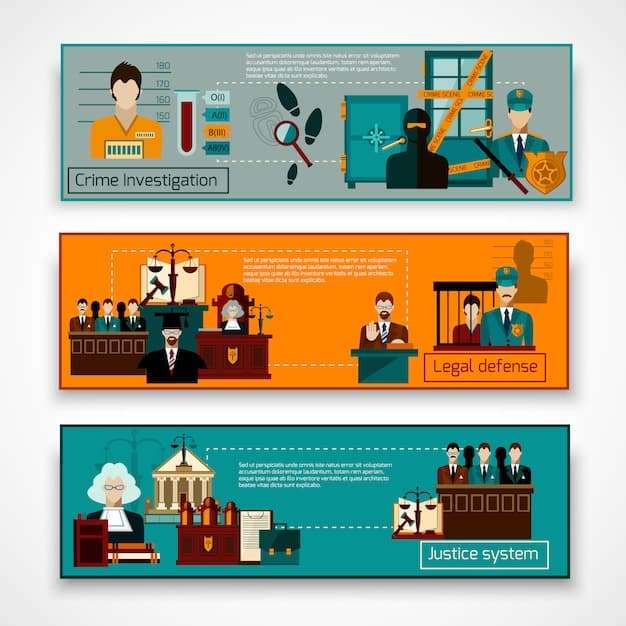Understanding Your Rights: A Victim’s Guide to the Legal Process

Understanding your rights as a victim of crime involves navigating the legal system with informed awareness, ensuring fair treatment, access to support services, and the opportunity for restitution and participation in legal proceedings.
Navigating the aftermath of a crime can be overwhelming, especially when trying to understand the legal processes involved. This guide, which focuses on understanding your rights as a victim of crime: a guide to the legal process, aims to empower you with the knowledge necessary to protect yourself and seek justice.
Understanding Your Initial Rights After a Crime
When a crime occurs, victims are immediately entitled to certain rights designed to protect their well-being and involvement in the ensuing legal processes. These rights are foundational, helping victims navigate the initial shock and confusion following a criminal act.
Right to Be Informed
One of the primary rights afforded to victims is the right to be informed. This includes timely updates on the status of the investigation, details about court proceedings, and information regarding the offender’s custody status. Knowing what is happening at each stage helps victims stay informed and prepared.
Right to Protection
Victims also have the right to protection from the offender. This can involve restraining orders, protection orders, or other measures to ensure the victim’s safety. These measures are crucial in preventing further harm or intimidation.
- Ensuring immediate safety and access to safe housing.
- Receiving information on available counseling and support services.
- Having the ability to consult with legal professionals.
Understanding these initial rights is the first step in reclaiming control after a crime. They ensure that victims are not left in the dark and have the necessary support to face the challenges ahead. Knowing your rights empowers you to make informed decisions and advocate for your needs throughout the legal process.
Navigating the Criminal Justice System
The criminal justice system can be complex and intimidating. Understanding the various stages and how they apply to your case is crucial for victims. This knowledge allows you to participate effectively and ensure your voice is heard.

Reporting the Crime
The first step in the criminal justice process is reporting the crime. This involves contacting law enforcement and providing them with the necessary information to begin an investigation. Accurate and detailed reporting is essential for building a strong case.
Investigation and Arrest
Following the report, law enforcement will conduct an investigation to gather evidence and identify potential suspects. If there is sufficient evidence, an arrest will be made. Victims may be asked to provide further information or testify during this stage.
- Knowing your role in the investigation.
- What to expect during the trial.
- Understanding potential outcomes and their impact.
By familiarizing yourself with the criminal justice system, you can better navigate its complexities and understand your role within it. This knowledge can help alleviate some of the anxiety and uncertainty that often accompany involvement in legal proceedings.
The Right to Restitution
Restitution is a critical component of the justice system, aiming to compensate victims for losses incurred as a result of the crime. Understanding this right is vital for those seeking financial recovery and closure.
What is Restitution?
Restitution involves the offender paying back the victim for financial losses directly related to the crime. This can include medical expenses, property damage, lost wages, and other out-of-pocket costs.
How to Claim Restitution
To claim restitution, victims typically need to provide documentation of their losses to the court. This can include receipts, medical bills, and wage statements. The court will then determine the amount of restitution to be paid by the offender.
Understanding restitution can significantly reduce financial burdens and provide a sense of justice. By actively pursuing restitution, victims can begin to rebuild their lives and move forward after a crime.
Victim Impact Statements
Victim impact statements provide a powerful opportunity for victims to express how the crime has affected their lives. These statements can be instrumental in the sentencing phase, influencing the judge’s decision.

Preparing Your Statement
When preparing a victim impact statement, it’s important to be honest and specific about the impact the crime has had on your life. This can include emotional, physical, and financial consequences. Detailing these effects helps the court understand the full scope of the crime’s impact.
The Impact on Sentencing
Victim impact statements can have a significant impact on the sentencing decision. Judges often consider these statements when determining the appropriate punishment for the offender. A well-articulated statement can influence the severity of the sentence.
- Emotional and psychological impact.
- Physical injuries and long-term health consequences.
- Financial losses and economic hardships.
Victim impact statements are a crucial tool for ensuring that the court understands the full impact of the crime. By sharing your story, you can advocate for justice and help ensure that the offender is held accountable for their actions.
Confidentiality and Privacy Rights
Protecting your confidentiality and privacy is a key aspect of victim rights. These rights ensure that sensitive information is handled with care and that victims are shielded from unnecessary exposure.
Protecting Your Personal Information
Victims have the right to request that their personal information, such as address and contact details, be kept confidential. This prevents offenders from using this information to harass or intimidate them.
Access to Counseling and Support
Confidentiality also extends to counseling and support services. Victims have the right to seek help without fear that their personal information will be shared without their consent.
- Requesting anonymity during legal proceedings.
- Limiting access to personal records and information.
- Ensuring safe and confidential communication with legal professionals.
By understanding and exercising your confidentiality and privacy rights, you can protect yourself from further harm and ensure that your personal information is handled with the utmost care. These rights are essential for maintaining your safety and well-being throughout the legal process.
Resources and Support for Crime Victims
Numerous resources and support systems are available to assist crime victims. Knowing where to turn for help can make a significant difference in your recovery and ability to navigate the legal system.
Victim Assistance Programs
Victim assistance programs offer a range of services, including counseling, legal advocacy, and financial assistance. These programs are designed to provide comprehensive support to victims of crime.
Legal Aid Services
Legal aid services provide free or low-cost legal assistance to victims who cannot afford to hire an attorney. These services can help you understand your rights and navigate the legal process.
Access to these resources can provide invaluable support and guidance as you navigate the aftermath of a crime. By seeking help from these organizations, you can ensure that you have the resources and support needed to reclaim your life and seek justice.
| Key Point | Brief Description | 📢 Right to Information | Stay informed about investigation and court proceedings. | 🛡️ Right to Protection | Obtain restraining orders for personal safety. | 💰 Right to Restitution | Claim compensation for crime-related financial losses. | 🗣️ Victim Impact Statements | Express the crime’s impact during sentencing. |
|---|
Frequently Asked Questions
▼
Your immediate actions should focus on ensuring personal safety and contacting law enforcement. Seek medical attention if needed, and try to preserve any evidence at the scene.
▼
Request regular updates from law enforcement or the prosecutor’s office. They are responsible for providing you with timely information about the progress of your case.
▼
Explore legal aid services or victim assistance programs that offer free or low-cost legal representation. These resources can help you understand your rights and navigate the legal system.
▼
Gather documentation of your financial losses, such as medical bills and wage statements. Submit these documents to the court, which will determine the restitution amount to be paid by the offender.
▼
A victim impact statement is a written or oral statement you provide to the court, detailing how the crime has affected your life. It can influence the judge’s sentencing decision.
Conclusion
Understanding your rights as a victim of crime: a guide to the legal process is essential for navigating the complexities of the legal system and ensuring your voice is heard. By knowing your rights, seeking support, and actively participating in the legal process, you can advocate for justice and begin the journey toward healing and recovery.





